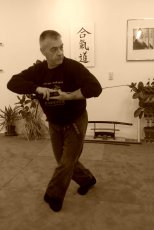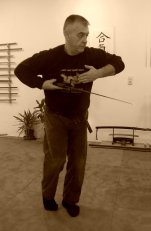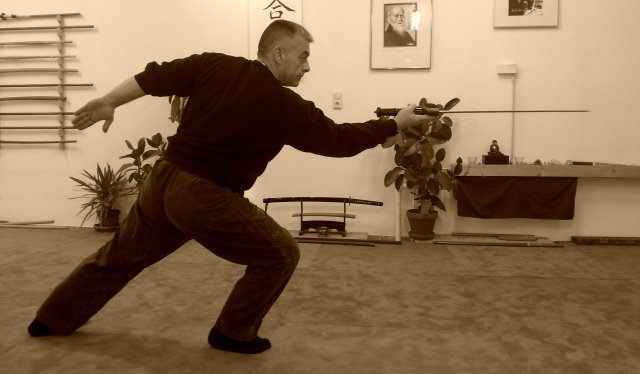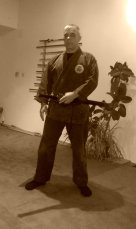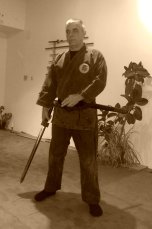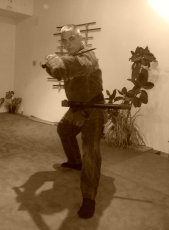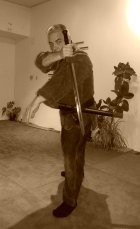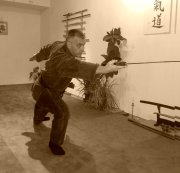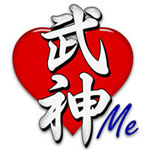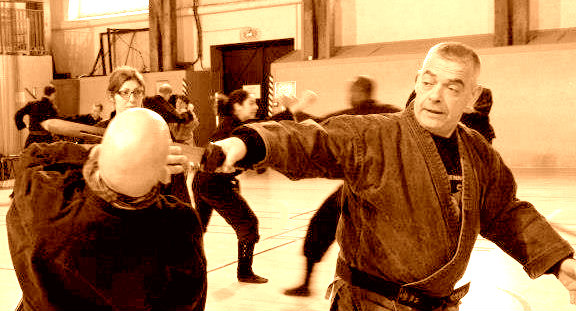From Shiro Kuma's Weblog by kumablog
 The asian astrological sign for the year 2013 is the snake (black snake or water snake). It is called Jyanen (snake year) in Japanese and the new year just began a few days ago. A few weeks before that sensei uncovered the theme for the year which is the Chinese sword, 劍. The Chinese sword (“jian” in Chinese, 劍) is called Ken (剣) in Japan.
The asian astrological sign for the year 2013 is the snake (black snake or water snake). It is called Jyanen (snake year) in Japanese and the new year just began a few days ago. A few weeks before that sensei uncovered the theme for the year which is the Chinese sword, 劍. The Chinese sword (“jian” in Chinese, 劍) is called Ken (剣) in Japan.
Having followed sensei’s teachings for many years I am used to his interesting way of interchanging kanji and his ability to create deep meanings in an apparent shallow sentence or aphorism. The beauty of Japanese language is that one (often him) can play endlessly with the sounds and say different things while using the same sounds. As you know, Hatsumi Sensei is very fond of puns and interchanging kanji.
If we follow his reasoning or at least his “wicked mind” (another邪念 janen)- we can say that as Ken is called Jian in China, maybe we should understand the year of the snake 蛇年 (jyanen) as being also the year of the Chinese sword 劒年 (Jian nen).
Until last summer sensei used to say that in 2013 we would be studying yari but then we are studying Chinese sword! So what happened? Here we can only guess. During the dkms sensei purchased a rare painting of Amateratsu in her cave (see post concerning that on this blog) that he exposed during training. Maybe this is what triggered him for changing the yearly theme and move to the study of the Chinese Ken.
Jyanen (year of the snake) sounds like jiannen (year of the Jian). But do you know that there is a connection between the Jian/Ken and Amateratsu no Kami the sun goddess of the Kojiki (Japanese mythology)?
Kojiki reminder: Because of Amateratsu’s brother, Susanô, the sun goddess decided not to get out anymore of her cave. Consequence: there was no more sun on earth. All the gods gathered and decided to organise dances and music to please the goddess. They finally succed and Amateratsu came out again, this is why every morning the sun rises and gives light to mankind.
So, shortly after the cave incident Susanô went to fight a hydra with eight heads. Like our Hercules of the Greek Mythology he had a hard time but he finally killed the monster. After his victory Susanô found a sword (the famous “Kusanagi no Tsurugi”) inside the tail of the hydra. Susanô decided to give it to Amateratsu to settle their dispute over the cave incident. This is why these two events are linked historically or at least in Japanese mythology. But this is not all.
Amateratsu was the grandmother of Ninigi no Mikoto, the first emperor of Japan and gave him this Ken, the mirror and the jewel (the three regalia of the Japanese Emperor) to show everyone that he was supported by the gods. This is the origin of the imperial power, and the proof of the link of the Emperor to the gods.
As a side note, Wikipedia explains that “the Imperial Regalia of Japan (三種の神器 Sanshu no Jingi / Mikusa no Kandakara), also known as the Three Sacred Treasures of Japan, consist of the sword Kusanagi (草薙劍 Kusanagi no Tsurugi), the mirror Yata no Kagami (八咫鏡), and the jewel Yasakani no Magatama (八尺瓊曲玉). The regalia represent the three primary virtues: valor (the sword), wisdom (the mirror), and benevolence (the jewel).”
When Amateratsu gave the sword Kusanagi to the Emperor she said it was to chase the demons, establish peace and restore unity. This transmission of power from the sun goddess to the first emperor is quite similar to the transmission given to Hatsumi sensei by the late Takamatsu sensei. On the makimono this year at the side of the Shinden is written a sentence of Takamatsu sensei: ”Kami Ori Tatara no Hôken Tamarite Tôyô Ashi ara Rokuni Arabaru no Takamatsu Sensei Tamawari”. Or “The divine protecting sword, is transmitted from Takamatsu to Hatsumi sensei to destroy evil and create peace and unity”.
Myths always carry symbols and we can easily understand here that, symbolically, the gods, by giving Kusanagi to the first emperor were in fact “transmitting their power” to mankind. From this day on, humans were to take responsibility for their own destiny. That was the beginning of our civilization.
When Takamatsu sensei gave the nine schools to Hatsumi sensei he did the same: he transmitted this power to Hatsumi sensei. And we can imagine that this is what sensei is doing now, he is giving us back our freedom of action. And the reason why he is doing that is, once again, hidden inside the kanji. The year of the Ken which is 劒年 (jiannen) can also be written as 自案年 (ji-an-nen – self thought year) or the year where we have to think on our own, i.e. to be the master of our destiny, to decide for ourselves and be responsible for our actions.
All over these years, Hatsumi sensei has created a dôjô to bring us to this level: this is the Bujinden, the place (palace?) for the transmission.
Thank you sensei for your trust. I sincerely hope that many of us will seize this chance to become a Bujin, a true being.


…


